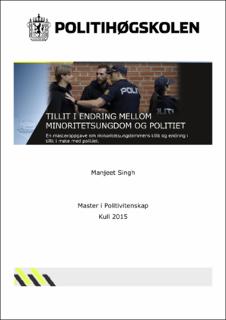Tillit i endring mellom minoritetsungdom og politiet: En masteroppgave om minoritetsungommens tillit og endring i tillit i møte med politiet
Master thesis
Permanent lenke
https://hdl.handle.net/11250/2656449Utgivelsesdato
2020Metadata
Vis full innførselSamlinger
Sammendrag
Politiet sitt forhold til publikum har lenge vært et interessant tema innenfor samfunnsvitenskapen. I disse tider så har det vært et særskilt og konkret fokus på relasjonen mellom Oslopolitiet og minoritetsungdom. På den ene siden har oppmerksomheten dreid seg om hvordan politiet jobber med minoritetsungdom og på den den andre siden at det rapporteres negative holdninger fra minoritetsungdom rettet mot politiets virksomhet. Det kan virke som om det er en forståelse hos samfunnsinstitusjoner som media, i politikken og innad hos politiet selv at dette kan henge sammen. Dette uttrykkes med økte ressurser og tiltak for å bedre relasjonen mellom partene. Er det økt innsats som innebærer kontakt med etnisk minoritetsungdom eller er det måten politiet opptrer på som kan styrke relasjonen? Denne oppgaven retter oppmerksomhet mot i hvilken grad minoritetsungdom endrer sitt forhold til politiet når de kommer i kontakt med politiet.
Problemstillingen i oppgaven er: I hvilken grad har minoritetsungdom tillit til politiet, og hvordan endres tilliten i møte med politiet?
Det er minoritetsungdommen sine opplevelser som er interessant i denne problemstillingen. For å kunne belyse problemstillingen er det blitt gjennomført en spørreundersøkelse ved videregående skoler i Oslo. På bakgrunn av dette datasettet som er et tverrsnitt tatt i perioden april-mai 2019 har jeg sett på hva respondentene rapporterer generelt på tillit, og tillit til ulike samfunnsaktører, samt til politiet spesielt. Funnene hos minoritetsungdom som gruppe ble undersøkt opp mot majoritetsungdommen for å kunne se på eventuelle parallelle funn.
Funnene indikerer at det er en betydelig grad av respondenter som rapporterer endringer både i svekkelse og styrking av tilliten. Minoritetsungdom rapporterer lavere tillit og at tilliten svekkes i større grad etter kontakt med politiet enn hos majoritetsungdommen. Oppgaven tar også opp prosessrettferdighet som utslagsgiver for denne effekten og problematiserer representativiteten til andelen av utvalget som valgte å svare på undersøkelsen. The police's relationship with the public has long been considered an interesting topic in the social sciences. These days, there has been a special and specific focus on the relationship between the police in Oslo and minority youth. Attention to the issue has on one hand been how the police work with minority youth and on the other hand that minority youth report negative attitudes towards police practices. It may seem that there is an understanding among social institutions such as the media, in politics and internally within the police force that this might be interconnected. This is expressed by increased resources and measures to improve the relationship between the parties. Is it increased efforts that involve contact with ethnic minority youth or is it the way the police behave that can strengthen the relationship? This paper draws attention to the extent in which minority youth changes their opinion of the police when they come in contact with the police.
The main question in the thesis is: To what extent do minority youth trust the police, and how does the trust change in contact with the police?
It is the experiences of the minority youth that are of interest in this context. In order to examine this, a survey was conducted at high schools in Oslo. On the basis of the data that is a cross-section taken in the period April-May 2019, I have looked at what respondents generally report on trust, and trust in various community actors, as well as the police in particular. The findings of minority youth as a group were examined against the majority youth in order to look at potential parallel findings.
The findings indicate that there is a significant degree of respondents who report changes in both weakening and strengthening of trust. Minority youth report to a greater extent a lower starting point for trust and that trust is weakened more than with the majority youth in contact with the police. The thesis also addresses procedural justice as the decisive factor for this effect and questions the representativeness of the sample that chose to respond to the survey.
Beskrivelse
Master i politivitenskap
